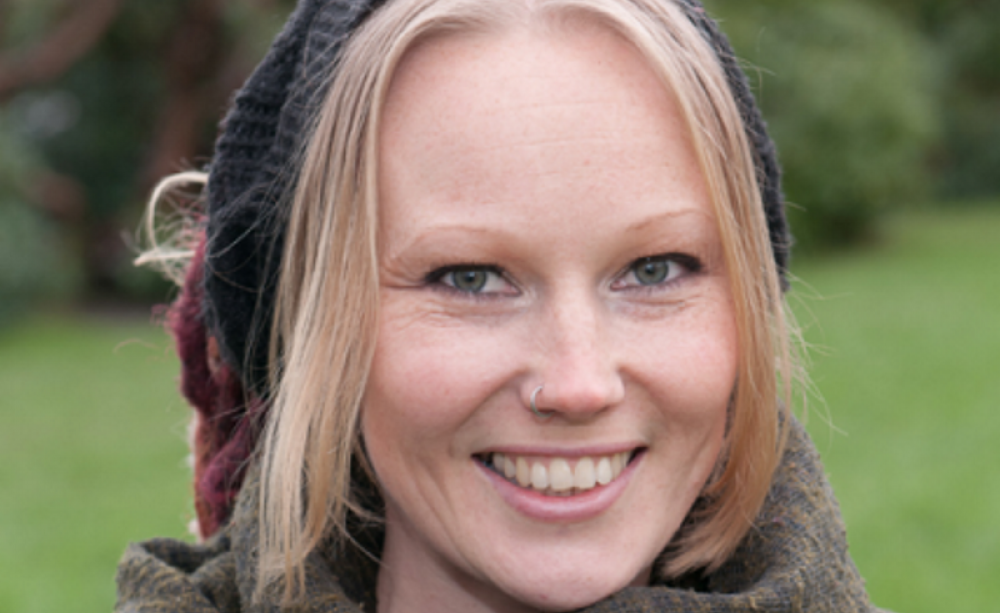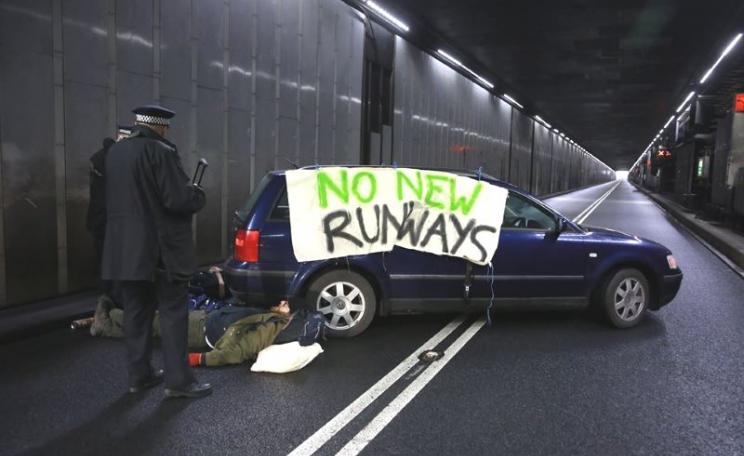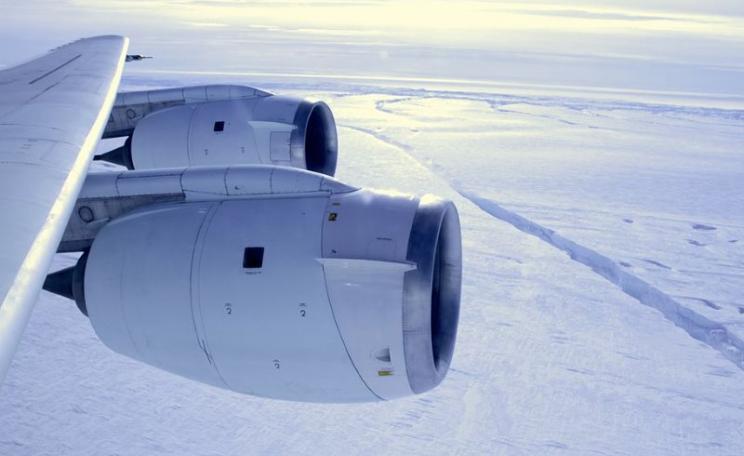Commit rebellious acts of kindness, speak with radical honesty, subvert the status quo with kindness, and open your heart to the struggle, for the struggle is for life. A meaningful life, a life of integrity and connection, life for all.
"When you see violence, greed and narrow-mindedness in the fullness of its power, walk straight into the heart of it, remaining open to the sky and in touch with the earth."
These words, taken from the Shambala Warrior Mind Training verses, were in my mind at 3.30am one day last July as I and 12 others cut through Heathrow airport's perimeter fence in west London and walked straight into the heart of the airport - onto the runway.
Once there we built a pipework fortress and locked ourselves to it to prevent planes from taking off. They circled in my mind as I lay on the runway, in touch with the earth, and gazed up at the open sky as the sun rose over London.
This was a peaceful, nonviolent action in the face of the violence of climate change, which kills 300,000 people a year. These are predominantly women, people living in poverty and communities of colour in the Global South. They have been suffering various forms of violence for centuries; climate change is a continuation of this.
It was the most impactful thing I could do with the resources I have. We prevented 4,500 tonnes of CO2 from being released into the atmosphere, equivalent to the annual output of 900 households.
The state responded by threatening us with yet more violence: prison. Thankfully, the judge's threat of a "custodial sentence" ended up as a six weeks imprisonment, suspended for 12 months - saving us from going to jail, so long as we avoid breaking the law again. This sentence followed much outcry in the media, public and even parliament denouncing the idea that we should serve time for our principled action.
The structural violence of the state
The corporate-state complex maintains structures of violence through laws, policing, prisons, trade deals and a lack of any meaningful agreement on climate change. The law maintains the right for corporations to profit at the expense of life, and the police dutifully implement these laws. Increasingly we are seeing police protecting businesses undertaking destructive work from people trying to prevent it - such as the lines of riot police walking trucks into a fracking site at Balcombe.
Activism is an important part of my Buddhist practice, and an expression of my principles of nonviolence. For me, structural violence is as important as individual / behavioural violence, and it's just as important to challenge it in nonviolent ways.
'Structural violence' refers to the systematic ways in which social structures harm or disadvantage individuals and certain groups, communities or classes of people. It's the suffering caused by policies, processes and social norms created by the structures of our society, including governments, organisations, institutions, the economy and financial system, and the wider socio-political system - they're embedded in the organisation of our world.
I hold the principle of nonviolence in the context of the Buddhist ethical principle of abstaining from taking life or doing harm and instead acting with loving kindness. I express this on an individual level not only by trying to avoid harmful behaviour, by not eating meat and by being kind to people in my daily life, but also by being a pro-life force in the wider world, taking action collectively with others.
For me, a deed of loving kindness is chaining myself to the gates of a fracking site so it can't pump toxic chemicals into the Earth; it's blockading a runway to prevent the release of thousands of tonnes of CO2 and highlight unnecessary airport expansion; it's supergluing myself to the front door of a PR company to draw attention to its covering up of human-rights abuses by dictatorial regimes.
Commit rebellious acts of kindness, speak with radical honesty, subvert the status quo with kindness, and open your heart to the struggle, for the struggle is for life. A meaningful life, a life of integrity and connection, life for all.
Our sacred duty: the cherishing of life
The flipside of not taking life is the cherishing of life, holding it sacred. It's a fierce solidarity with all of life and living beings, especially those without a voice - standing with them in their struggles, fighting with them for justice. Taking action when profit is being prioritised over life, an all too common occurrence in today's capitalist world. It's about honouring how deeply connected we are with everything and everyone else - my struggle is your struggle, and until we are all free no one is free.
Kindness is a turning towards. Turning towards all beings, in their joy and flourishing and in their pain and suffering, not shying away from the pain and damage being inflicted upon the Earth and our people for profit.
I can practise generosity on this level too. The biggest gift I can give is myself, my life. Giving myself to the world, to liberation, to justice. The peace, liberation and development of ourselves are ultimately bound up with the peace, liberation and development of our communities and society.
With this ideal as my bedrock, my life becomes an offering, choosing to live a life of integrity and solidarity rather than one of security and comfort. The gifts I can give are my time, my energy and my love, but also my privacy, security, safety and comfort - even my liberty.
For me, the principle of truthful communication extends beyond being honest in the conversations I have with the people around me. It's about speaking truth to power. It's about speaking up and calling out violence, oppression and injustice, not being willing to allow those things to happen without accountability from those inflicting it.
Expressing truth through words and action
Truthful communication happens at the level of public discourse as well as interpersonally; we can change that discourse. In 2009, amidst mass protest and public pressure, David Cameron pledged: "The third runway at Heathrow is not going ahead. No ifs, no buts."
He later reneged on that promise under corporate pressure, and commissioned Sir Howard Davies to investigate which airport to expand (not whether to expand or not), and Davies' report recommended Heathrow. The debate centred around Heathrow or Gatwick, with climate change totally sidelined until our action highlighted the option of neither because any new runway anywhere is incompatible with a safe climate. Climate change is now in the debate.
Spiritual paths often focus on individual change, which is an important part of changing our world. But to be fully aware and alive in our times is to understand the destructive power structures that make our society, to not be complicit in them, and to join the struggle to change them. The two are inseparable.
The Zen priest Angel Kyodo Williams wrote: "Without inner change, there can be no outer change; without collective change, no change matters."
The Buddha taught that our actions have consequences, and that at the root of our suffering is our sense of a self that is separate from the world. But these principles also operate on a collective, social level. Karma vipaka is the consequences of our actions: the fruits we reap as a result of our actions.
What is our collective karma vipaka? Climate change. Resource depletion. Extreme inequality. Economic collapse. Ecological collapse. We can change our collective karma and change our collective karma vipaka by acting collectively.
So, commit rebellious acts of kindness, speak with radical honesty, subvert the status quo with kindness, and open your heart to the struggle, for the struggle is for life. A meaningful life, a life of integrity and connection, life for all. A life-affirming vision of cooperation rather than competition, of solidarity rather than selfishness, of generosity rather than greed.
Let's stand together and pour love back into our communities, and join with others to dismantle the structures of oppression and reclaim our right to live as if the world mattered.
Kara Moses is a freelance journalist.
This article was published in the May/June 2016 issue of Resurgence & Ecologist magazine.







